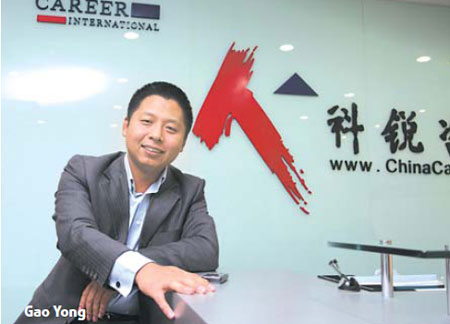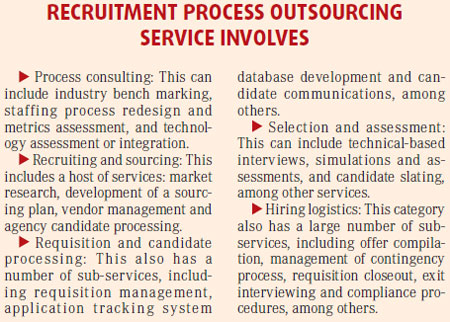


"We want to be the wife of our client instead of his lover," 34-year-old Gao Yong notes, referring to his company's RPO (Recruitment Process Outsourcing) business.
The founder and president of domestic recruitment total solution provider Career International is a pioneer in introducing RPO to China. Gao describes it as establishing common interests and a permanent mutual-care relationship, instead of an intimate, but temporary one, with clients.
In 2004 privately owned Career International got its first RPO order to recruit and manage 100 office employees. The Beijing-based agency now boasts over 300 consultants in eight offices across China, providing services for companies engaged in 15 industries. It recruits thousands of staff, ranging from senior executives to middle-level managers to office clerks, every year.
RPO means that a company has outsourced part or all of its recruitment process to a third party, and the service provider should be responsible for optimizing the recruitment process, rearranging the recruitment resources, cutting recruitment costs, as well as providing professional recruitment skills, tools and technology.
While it is commonplace in North America, Britain and Europe it is still in the embryonic stage on the Chinese mainland.
It was an "accident" that Career International began its RPO business. Since its establishment in 1996, the agency has been focusing on corporate headhunting.
In 2004, a domestic large private industrial group hired Career International to find a senior executive, and the agency's performance pleasing and the group asked Gao to find some middle managers and again Career International met the company's requirements.
Shortly thereafter Gao was told, "you may go ahead and help us recruit all our office staff."
Gao was very excited. "Both my client and I were happy," he says, "but I did not know the model was called RPO then."
In general, businesses looking for top-level executives pay a headhunter on a retainer basis, usually 20 to 30 percent of the recruited executive's first-year salary, and those looking for middle-level managers pay on a contingency basis, says Peng Jianfeng, professor with the Renmin University of China and a senior human resources (HR) analyst.
"When combining them together, as the process is similar, the cost may drop and the agency can get more margin room," he says.
Gao took on RPO as an emerging business for Career International and studied many foreign cases on it to make the business not only more professional but also more localized in order to win clients.
In explaining Career International's unique approach, Gao says at the time he and his consultants were almost camped out in the private industrial group's office everyday in order to obtain a clear understanding of what kind of talents the client really needed, what the corporate culture was and kinds of personalities the business was looking for.
"We are in the same boat (with our clients), we take care of them, and make decisions for both of us, just like a wife operating a family, seeking harmony and growth," says Gao.
Risk control tool
Majoring in English language from Beijing Foreign Language Study University, Gao, born in rural Northern China, got his first job immediately after graduation in 1995 working at a small local headhunter agency. Restless, Gao left the agency in 1996 to found Career International with money borrowed from friends.
It has three pillar businesses: headhunting, temporary staff recruitment and RPO. Finding executives for top corporate positions makes up 80 percent of its revenue as a whole and 80 percent of its client are transnational firms to date. The company's yearly net revenue jumped from 10,000 yuan in 1996 to 120 million yuan in 2007.
But the global financial woes have had a distinct ripple effect on the corporate world and as salaries for CEOs and presidents drop, headhunting is becoming correspondingly dim.
But Gao says the RPO approach can provide a cost-cutting solution.
"Many multinationals in China, who previously separated senior executive hunting and staff recruitment now prefer to package the two sectors, and some have turned to us for related services," says Gao.
Gao says the powerful human resource multinationals in China, such as Hudson and Manpower, are also potential competitors.
"But in the mainland market so far, I don't think they are competitors yet, for the RPO sector, as they are eyeing the high-end market and have not yet seen RPO as a growth engine," he says.
"Under market turmoil, operators with quick response and full flexibility will take the lead," says Peng.
Gao says Career International, knows the local conditions better than the transnationals, designs and revises solutions much faster, and cooperates with clients more flexibly.
"Most importantly, we are zero-distance with our clients geographically and culturally, we are zero-distance with Chinese market, and we and our clients are like a family on the same side of the fence," adds Gao.

(China Daily 12/29/2008 page7)













